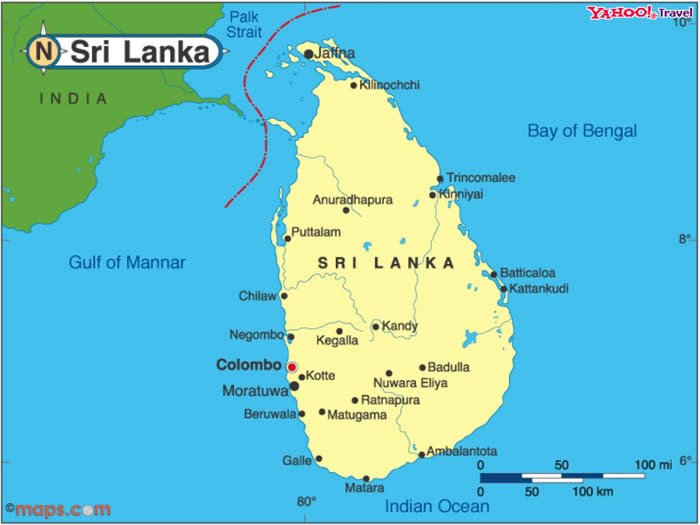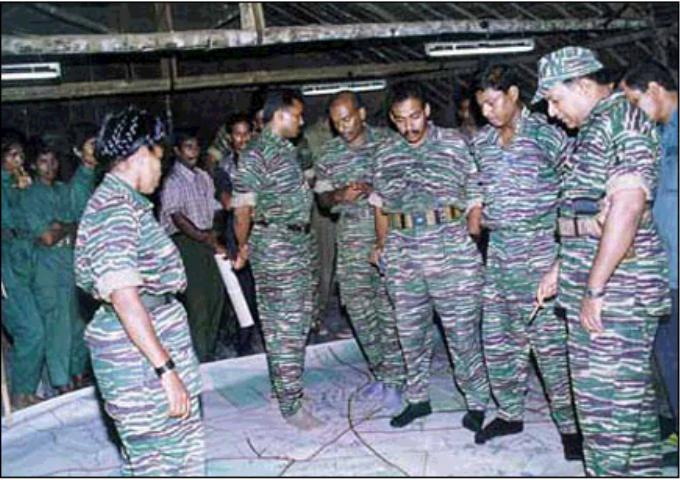
SANGAM.ORG
Ilankai Tamil Sangam, USA, Inc.
Association of Tamils of Sri Lanka in the USA
by Chandi Sinnathurai, Dissidentvoice.org, January 7, 2006
| The reality is that the workings of the international system will unlock the door of endorsement SOLELY to the one who owns the master key to leverage. |
Ten is a number of power. The tenth item on the joint statement released by India and Sri Lanka at the conclusion of President Rajapaksa’s state visit has to be viewed with caution. If attempts to water down the current “dust of war” fail, as the Tamil Tiger supremo vowed at the November 2005 Maveerar Nal (November 27, a day in which reflective celebrations and fasting are held in memory of all the fallen Eelam fighters of valor), all other options will run out except to intensify the struggle for self-determination.
The intransigence of the Colombo Government is revealed by a string of serious breaches of the CFA (Ceasefire Agreement): civilian killings, abductions, involuntary disappearances, gang rapes by the SLA (Sri Lanka Army) including the Christmas Eve high profile murder in the Cathedral of Mr. Joseph Pararajasingham by the State-sponsored forces. All these nefarious activities unfortunately seem to weigh opposite to a diplomatic settlement.
Against this background, one should read the tenth item in the Joint Statement:
The two leaders welcomed the bilateral understandings being reached on identifying joint ventures for the development of the eastern Sri Lankan port city of Trincomalee, and its surrounding region. They noted the need to prepare a Master Plan for realizing, including through the building up of the necessary infrastructural support, the full economic potential held out by Trincomalee and its environs. It was agreed in this context that a coal based power project of capacity 2x250 MW will be set up in the Trincomalee region of Sri Lanka, as a joint venture between the National Thermal Power Company Ltd, a Government of India enterprise and the Ceylon Electricity Board, a Government of Sri Lanka entity. The Government of Sri Lanka will have the responsibility of facilitating and extending all necessary help in setting up this project. A detailed Memorandum of Understanding for setting up the Power Project is to be signed separately.” [italics added]
India, the US proxy in the region, negotiating a Master Plan for setting up a Power Project in the Eastern Port city is not without its strategic, geopolitical interests. Hence the open secret remains that the US cannot be twiddling its thumbs while a power deal of this magnitude is seemingly in full flight. From the evidence at hand, one might also deduce that this so-called power project may just be a cover-up operation for US expansion into the region. For this program to succeed, the control of Trincomalee (Trinco) harbor is pivotal. Trinco is renowned as the world’s second best sanctuary for ships. Historically, it has been known that Trinco played a crucial role in the imperialist expansion of the Western powers. The British aircraft carrier Hermes, sunk by the Japanese, is still at the bottom of Trinco harbor. The Japanese takeover of the island was missed by only a whisker because of an intelligence failure. That control of Trinco is alluring to imperialist powers is a fact that has not escaped the radar of the Tamils.

If the CFA collapses and a full-scale war erupts again, there is no way that the Tamil Tigers are going to ignore Trinco (the Tamil Eelam Capital). All the foreign powers that are paying lip service to peace in Sri Lanka have shown very little concern thus far to the fundamental grievances of the Tamils. There is obviously a valid reason for such an international position.
The Tamil Tigers have not abandoned the Tamils’ right to secede, nor have they dismantled their military system. On that basis alone, the international community’s rationale in this regard is rudimentary. However, should the Tamils regain control of Trinco Harbor, the Tamils would also gain leverage over geopolitical concerns in the region. So, in order for that to NOT occur, a waylaying tactic is underway to “keep talking peace.” In the meantime, under the very nostrils of the international community, the State Forces are unleashing a program of systematic liquidation of the Tamils and occupation of more Tamil territory.
The Tamil Tigers have a keen insight into these geopolitical plans. The following reasons (and more) make Trinco a geopolitical jewel in the crown:
a) the strategic harbor
b) 99 oil tanks now leased to India
c) the country’s largest Prima flour mills
d) a large air base.
e) as well, the “Coal-based power project” along with the other geopolitical ambitions, etc.
Seasoned analysts have already spilled much ink on their prediction that, if an Eelam war were to begin today, the Tamil Tigers’ plans to lay siege on Jaffna would unfold.

The Tigers had control of Jaffna from 1990 to 1995. Reclaiming the cultural capital of the Tamils would undoubtedly be a morale boost to the Tamils. None, on the other hand, should underestimate the psychological shift that would cause among the Sinhalese. However, in the same breath one could argue that the capture of Trinco would yield a seismic shift to the Tamils in the balance of power nationally and would accrue powerful leverage in terms of international and regional geopolitics. Achieving such an advantageous posture on the part of the Tamils would truly gain a lion’s share in terms of the Eelam pie.
If the Tamil Tigers should regain control of Trinco, of course, like a domino effect, the Tamils would inevitably gain total control of Jaffna. This unprecedented move would, without any doubt, paradoxically equal in impact the Gandhian “Salt March” in terms of dismantling alien rule.
If that becomes the reality-on-the-ground, the Sinhalese State will be well advised to respectfully walk out from Tamil homelands.
We say this because of an historical precedent. Many will remember that the British Empire began to tumble as a consequence of the Salt March. The British took the cue and invited Gandhi to London, as decency would call for gentlemen to act at the Round Table Conference to “hand back” power. In the eyes of Churchill, of course, the Mahatma was a “seditious middle temple lawyer.” When this “half naked fakir” met the immaculately attired Viceroy, Lord Irwin, Gandhi chuckled: “I have caused a great deal of trouble for your government. But as men, we can set aside our differences for the welfare of the nation.” Gandhi went on to explain India needed to be as completely free and independent as the English.
Wresting Trinco out of Sri Lankan Government control will be a deciding factor of the presence of State security forces in the peninsula. If the Sri Lanka Military looses control of Trinco, it will have a knee-jerk-effect on Jaffna. The ultimate result of such scenario would be that the Sri Lankan troops (over 45,000) in Jaffna peninsula would be confining themselves to the Camps and literally starving of inaction in a time of fierce conflict.
Available “Tactical Surveillance” (2001 reports) from the US Army Pacific Command (USARPAC) in anticipation of a Regional Tiger threat, perceived or real, observed the following:
*13 Liberation Tigers of Tamil Eelam (LTTE) camps have been set up around the Southern perimeter of Trinco from Ilankkantai in the Eastern direction.
* The 14th LTTE camp is erected in Kurangu-Pachan-Kulam
* Ilankkantai camp is situated within about 4 miles of Trinco Bay, close to Foul Point. This would form a chief launching pad on Trinco.
USARPAC chief Admiral Dennis Blair, in his July 2001 meeting with the Sri Lanka President and the Military counterparts, warned of such an imminent “worst case scenario” presenting itself from the LTTE.

No one wishes for war -- even on their worst enemy. War is dirty and bloody. Equally, Ceasefire/semblance of peace in Sri Lanka is also obscene and bloody -- the killing of non-combatants, including serious breaches of human rights, continues. It appears that the Tamils are currently caught in a dark cul-de-sac. That could very well be just an optical illusion.
In the event of a “final” Eelam War IV, it appears that the sea Tigers might have to play a dominant role, synchronizing maneuvers with the Tiger Air power. In these battle formations, of course, one cannot be too ingenious or too cocksure.
If Colombo decides to reignite the war machinery, the Tigers are at an advantage. They would be in total control of the battle strategy. The pouncing of the Tigers is believed to be sharp, but short. Putting it differently, the war of independence is not expected to be a long-drawn-out one. The final war operation would reveal the meticulous planning and tactical genius of Mr. V Prabaharan. The capture of Elephant Pass Garrison from the state forces in 2000 exposed the truth that the Tamil Tigers have well-honed skills to deflect Colombo’s airpower. Coupled with that experience, it is asserted that the precise execution of a crack commando unit and the deployment of complex maneuver warfare is deemed to achieve, in all probability, its desired aim; that is, 1) to shift the balance of power nationally 2) to capture the power of leverage geo-politically.
The Tiger supremo is both a brilliant military leader and a patient diplomat. The tackling of the National Question involves an equation of 20% military and 80% political. It is, however, the Tamil Tigers’ military power that predicates essentially the Tamils’ dexterity to negotiate their political rights. Therefore, it is illogical and biased for the international community to insist on the disarmament of the Tamil military system under the guise of “terrorism.”
War or peace, either way the Tamils will have to fight for their corner. Fight they must for their political and human rights, and of course for their mere survival. The reality is that the workings of the international system would unlock the door of endorsement SOLELY to the one who owns the master key to leverage.
It is reasonable to assume that international recognition of Tamil sovereignty will follow suit only after these maneuvers have successfully reclaimed the bulk of the lost territory including the “Jewel in the Crown.”
The West is cautiously watching what sort of leadership and governance Tamil independence will come up with. It must be noted, apart from Tamil Nadu, that the majority of the exiled Tamil Diaspora are in the West. Owing to the pressure/veiled threat from the international community, the Tamil Tigers cannot endorse an evil system of racist Gestapo-type governance in Sri Lanka. For the sake of talking peace, the Tamils cannot cooperate with evil.
Frankly, the so-called peace process is a waste of space and time, a costly distraction, and a media circus! I say this advisedly. Colombo is not interested in peacemaking, period. The talks are simply based on duplicity. Succumbing to such illicit closed-door activities will only betray the aspirations of a wounded Tamil nation. It might irrecoverably damage the trust of the freedom-loving (Viduthali Virumbigal) masses. The Colombo government knows that! By doing so, not only will the moral weight of the Tamil struggle be seriously compromised, but it also will undermine the altruistic ethos of the liberation movement!
The slow holocaust of the Tamils must end today. The humiliation of the Tamils must end soon. Eelam Tamils are among the most persecuted human beings of the world. At the conclusion of hostilities, honorable peace must descend on all hearts and minds.
The Tamils have learned from world history that new nation states are never given; they are always won.
Reverend Chandi Sinnathurai, currently residing in Thondaimanaaru, wishes to humbly dedicate this piece in memory of the slain Tamil legislator Joseph Pararajasingham: “Though he is dead, he still speaketh.”
© 1996-2026 Ilankai Tamil Sangam, USA, Inc.